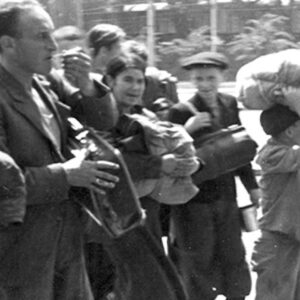
Azareen Van der Vliet Oloomi on Articulating Grief to Find the Way Back to Reality
In Conversation with Mitzi Rapkin on the First Draft Podcast
First Draft: A Dialogue of Writing is a weekly show featuring in-depth interviews with fiction, nonfiction, essay writers, and poets, highlighting the voices of writers as they discuss their work, their craft, and the literary arts. Hosted by Mitzi Rapkin, First Draft celebrates creative writing and the individuals who are dedicated to bringing their carefully chosen words to print as well as the impact writers have on the world we live in.
This week, Azareen Van der Vliet Oloomi joins Mitzi to discuss her new novel, Savage Tongues, out now from Mariner Books.
Subscribe and download the episode, wherever you get your podcasts!
From the episode:
Mitzi Rapkin: You said the process of getting ready to write this book was taxing. Was it because the research and how much pain you were investigating?
Azareen Van der Vliet Oloomi: Well, it’s a novel of grief. And I don’t think that writing about sexual violence and the ways in which sexual violence is connected in certain spaces to geopolitical conflict is an easy space to enter into, especially for female writers. I’m not just writing about sexual violence, right, I’m writing about the ways in which geopolitical conflict, war, violence, that kind of violence is very much part of our ideas of how we perpetuate and defend nationhood and our ideas of nationhood, and our imaginary constructs of nationhood are very masculine and patriarchal. It’s no accident then that even at our border, or any other space of conflict and chaos, rape happens as a war crime with increasing frequency, because it’s an extension of that kind of patriarchal mode of domination and occupation. So, it’s a complicated way to present sexual violence and the way that history gets embedded into feminine bodies. I had to do a lot of preparation emotionally, but also intellectually, in order to get there.
Mitzi Rapkin: You said you wanted to explore this concept of female violence and violence on females, and I’m wondering if that exploration led to any discoveries for you.
Azareen Van der Vliet Oloomi: Sure. The process was really about finding language for experiences that exist beyond language, or how grief that pushes us into the unspeakable robs us of our voice. The process of actually finding the language is really central to the novel, because the narrator is a writer. I think that engaging in that process of trying to articulate a pain or a grief that is so great and so annihilating and complex, and trying to archive it, is a way of finding one’s way back to reality from horror. You always drag that horror back into your reality with you, you don’t leave it behind, but I think it’s a process of metabolizing and integrating a grief that is tremendous in scale. I really do believe that language has its own consciousness and is organic and alive. And I’m in conversation with language, rather than mastering language as a writer. That’s more of an accurate description of my relationship to it. I think that writing the novel just validated that for me, because I can see how capacious language is and how much it can hold, and that is in itself is a really beautiful, optimistic thing, right? The level of grace that language offers us, and healing.
***
Azareen Van Der Vliet Oloomi is the author of three novels. Her second novel Call Me Zebra won the PEN/Faulkner Award for Fiction, the John Gardner Award, was long listed for the PEN Open Book Award, was an Amazon Best Book of the Year, A Publisher’s Weekly Bestseller and named a Best Book by over twenty publications. She received a 2015 Whiting Writers’ Award and was a National Book Foundation “5 Under 35” honoree for her debut novel, Fra Keeler. Her latest novel is Savage Tongues.
First Draft: A Dialogue on Writing
First Draft: A Dialogue on Writing is a literary podcast produced and hosted by Mitzi Rapkin. Each episode features an in-depth interview with a fiction, non-fiction, essay, or poetry writer. The show is equal parts investigation into the craft of writing and conversation about the topics of an author’s work.


















